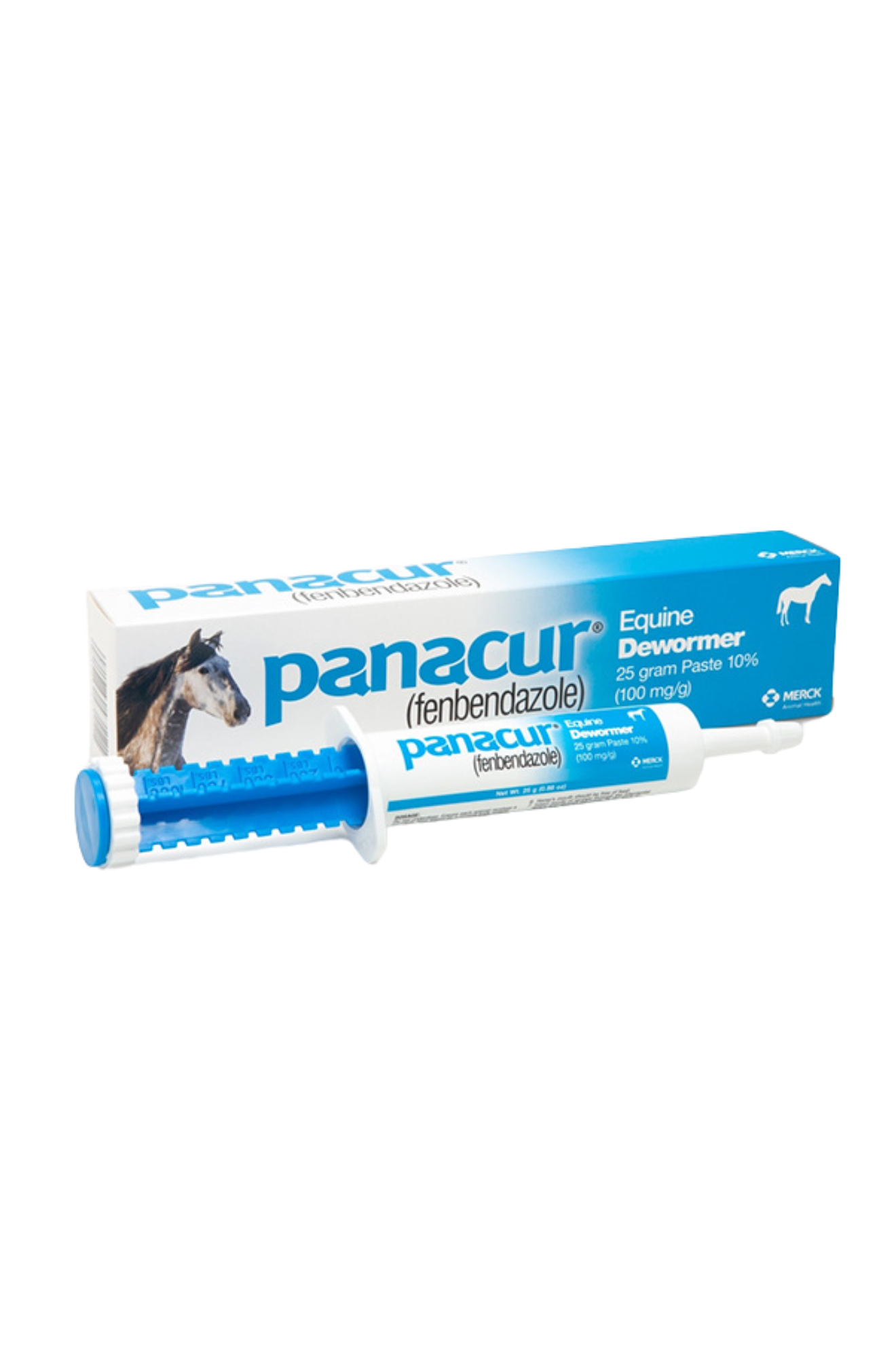1
/
of
1
ANIMAL HEALTH INTERNATIONAL
PANACUR DEWORMER
PANACUR DEWORMER
Regular price
$15.95 USD
Regular price
Sale price
$15.95 USD
Quantity
Couldn't load pickup availability
Keep horses healthy with Intervet Panacur Equine Dewormer Paste that contains Panacur (fenbendazole) Paste 10%. Each gram has 100 mg of fenbendazole, also known as "methyl 5-(phenylthio)-2-benzimidazole carbamate." The antiparasitic action of Panacur horse worm medicine is believed to be due to the inhibition of energy metabolism in the parasite. Artificial apple-cinnamon flavor. 25G
- Indications: Panacur (fenbendazole) Paste 10% is indicated for the control of large strongyles (Strongylus edentatus, S. equinus, S. vulgaris), encysted early third stage (hypobiotic), late third stage and fourth stage cyathostome larvae, small strongyles, pinworms (Oxyuris equi), ascarids (Parascaris equorum) & arteritis caused by fourth stage larvae of Strongylus vulgaris in horses
- Panacur (fenbendazole) Paste 10% is approved for use concomitantly with an approved form of trichlorfon. Trichlorfon is approved for the treatment of stomach bots (Gasterophilus spp.) in horses. Refer to the manufacturer's label for directions for use and cautions for trichlorfon. Contraindications: There are no known contraindications for the use of Panacur (fenbendazole) Paste 10% in horses.
- Administered orally
- Each gm of Panacur (fenbendazole) Paste 10% contains 100 mg of fenbendazole
- Apple cinnamon horse worm medicine
- Dosage:Administered orally at a rate of 2.3 mg/lb. (5 mg/kg) for the control of large strongyles, small strongyles & pinworms. One syringe will deworm a 1100 lb. horse. For foals and weanlings (less than 18 months of age) where ascarids are a common problem, the recommended dose is 4.6 mg/lb. (10 mg/kg); one syringe will deworm a 550 lb. horse. For control of encysted early third stage (hypobiotic), late third stage and fourth stage cyathostome larvae & fourth stage larvae of Strongylus vulgaris, the recommended dose is 4.6 mg/lb. (10 mg/kg) daily for 5 consecutive days; administer one syringe for each 550 lb. body weight per day.
- Precautions: Side effects associated with Panacur (fenbendazole) Paste 10% could not be established in well-controlled safety studies in horses with single doses as high as 454 mg/lb. (1,000 mg/kg) and 15 consecutive daily doses of 22.7 mg/ lb. (50 mg/kg). Particularly with higher doses, the lethal action of fenbendazole may cause the release of antigens by the dying parasites, which may result in either a local or systemic hypersensitive reaction. As with any drug, these reactions should be treated symptomatically. Panacur (fenbendazole) Paste 10% has been evaluated for safety in pregnant mares during all stages of gestation with doses as high as 11.4 mg/lb. (25 mg/kg) and in stallions with doses as high as 11.4 mg/lb. (25 mg/kg). No adverse effects on reproductivity were detected. The recommended dose for control of 4th stage larvae of Strongylus vulgaris, 4.6 mg/lb. (10 mg/kg) daily for 5 consecutive days, has not been evaluated for safety in stallions or pregnant mares. Internal Parasites: Regular deworming at intervals of six to eight weeks may be required due to the possibility of reinfection. Migrating Tissue Parasites: For 4th stage larvae of Strongylus vulgaris, treatment and retreatment should be based on the life cycle and the epidemiology. Treatment should be initiated in the spring and repeated in the fall after a 6 month interval. Optimum Deworming Program for control of S. vulgaris: Optimum reduction of S. vulgaris infections is achieved by reducing the infectivity of the pastures. When horses are running on pasture in temperate N. America, maximum pasture infectivity occurs in Oct-Dec. If horses are removed from those pastures in January, pasture infectivity will decline to zero by July 1. Egg production of S. vulgaris is minimal from Jan-Apr, peaking in August and declining to minimal values in December.
- WARNING: Do not use in horses intended for human consumption

